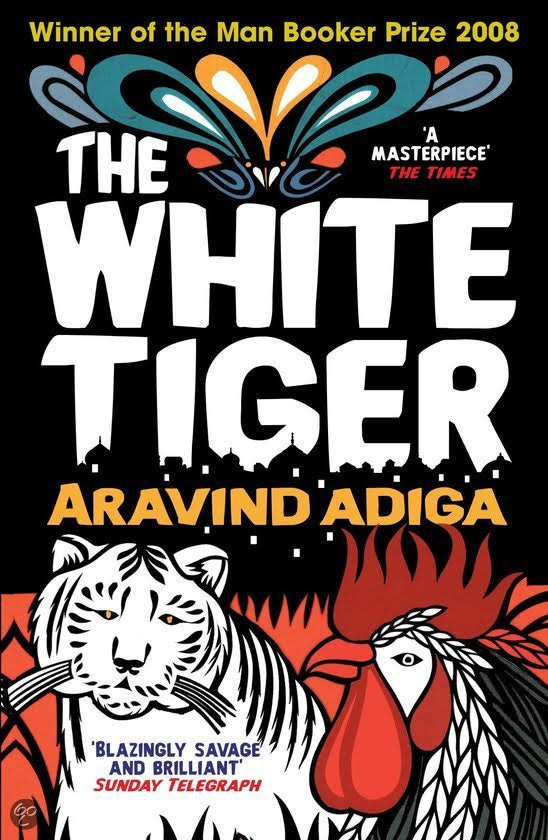Salutations, bibliophiles.
Today, I’m very excited to bring you
.Hoang writes
, where she shares stories that illuminate her experience as a village girl who had (and still do) big dreams, through the lens of food, family, books, and experiences.Here, she shares the story of the book that made her — White Tiger by Aravind Adiga.
—
“How far would you go to achieve your dreams?” is a question that lingered in my mind after reading The White Tiger by Aravind Adiga. In September 2021, when I read this book, which I discovered not by recommendations or at the library but via Netflix. The book’s adaptation to film was so incredible that my eyes glued to the screen for the entire two hours. Afterwards, I had this visceral, unsettled feeling; the story made me angry. Even now, when I think of it, I still get goosebumps.
The White Tiger is part confessional, part coming-of-age story about a boy named Balram Halwai who, to no fault of his own, was born into the lowest caste in India. Growing up as a poor villager, he was keenly observant of his social status. And yet, he was also unaware of how people in higher castes lived or how they got there…until he was hired to work as a driver for the son of a wealthy businessman and his wife.
Suddenly, Balram is ensconced in the world of surplus and extravagance that he could only dream of. In this new world, he learned who the good guys and the bad guys were. The former were far and few, while the latter existed everywhere, from the other servants in the house to the street vendors to people from his own village.
Things seemed to be going well until one night, while driving in pitch black darkness, Balram experienced the unthinkable, and what happened after was beyond anything he could possibly imagine. Fueled by anger, Balram subsequently makes decisions that led him to become a successful entrepreneur, at the expense of others.
As someone who also grew up in poverty, I was visibly shaken by the vivid descriptions of it in this novel. In perhaps one of the most powerful scenes I’ve ever read, Adiga describes Balram’s shock upon discovering that he could brush his teeth.
“Why had my father never taught me to brush my teeth in milky foam? Why had he raised me to live like an animal? Why do all the poor live amid such filth, such ugliness? Brush. Brush. Spit. Brush. Brush. Spit. If only a man could spit his past out so easily.”
That such a simple act can initiate a wide range of emotions both within the protagonist and myself is an example of Adiga’s stellar prose style—which can be best described as part epistolary, part bildungsroman. I saved the quote because it reminds me, as the reader and observer, to never take such simple acts for granted, for it may not be possible for people in other parts of the world. It certainly wasn’t possible for Balram until that moment—the kind of moment where he experienced true clarity.
In another scene, Balram is with his boss, Mr. Ashok, during one of his depressive modes. “Sometimes I wonder, Balram. I wonder what’s the point of living…,” Mr. Ashok says. To which Balram comforts Mr. Ashok, barely a few years his senior, by telling him stories and wisdom that his grandmother bestowed upon him. Later, he thinks to himself, “Do we loathe our masters behind a facade of love—or do we love them behind a facade of loathing?”
This kind of self-questioning shows Balram’s character growth. You could almost see wisdom seeping through his bloodstream. He understands his role as a servant—serving both as a driver and a listener—but he also understands the inequality that exists between them.
***
The New York Times calls Balram “a modern Indian hero,” but I don’t believe this is entirely true. Balram is, in many ways, the driver of his own story, but he is not the hero of it. He was put in a precarious position where the line between right and wrong are opaque. He is indeed highly driven and resilient but struggles with his inner morals.
Like the unnamed protagonist in Viet Thanh Nguyen’s The Sympathizer, what makes Balram’s story complicated is that he is a man of two faces. On one hand he committed what can be considered a “crime,” but on the other, you can almost excuse his crime. In many ways, he took what he was given and made it his own. He built a thriving taxi business with the money he took from his employer, shuttling the wealthy as well as technology workers in Bangalore.
The book came into my life at a time when I was struggling in my career, or lack thereof. I was working at a job that paid very little and I had little support both within my job and with growing my career. I was also trying to be a writer on the side, hoping that I could transition into writing full-time. Reading the book forced me to think about the lengths to which one would go to achieve their dreams and what meant for my own dreams. It also reminded me of another element in the struggle for upward movement: humility. It’s a book about right and wrong, and while I think the protagonist knew the difference, he pushed it aside in the pursuit of his goals.
Still, I understood exactly how Balram felt growing up in such an environment. And I, too, have always considered myself ambitious, but if I was put into the same position, it’s difficult to say whether or not I would do the same thing that he did. Perhaps by telling a Chinese government official his rags-to-riches story, Balram can experience a true reckoning. You can spit out your past, but not forever. At some point, it will catch up to you.
P.S. For more ways of getting your writing in front of new readers, consider becoming a paying subscriber today.








This was such a good read. I read White Tiger years ago, soon after it came out, and I have re-read it several times. Hoang's piece opened up a fresh perspective on it for me and yes, I see some interesting parallels with The Sympathizer - not only with respect to the moral ambiguity and dilemmas of the protagonists but the sharp writing, the biting humor, and the very human heart beating on every page.
I have seen the movie at least four times. I already have the book but I did not get to it yet.
I also grew up in poverty and abuse, but not with the intensity of Indian existence. I've seen it several times because I am 'forcing' people to watch it with me.
I've been in India three times and what I found most striking about the movie and the story is how real it feels. I also understand the loathing. I left the communist country I was born in because of the intensity of the loathing I felt towards the system.
....just to end up, ironically, in a place where politics is becoming even more loathsome than the communism I left for it.